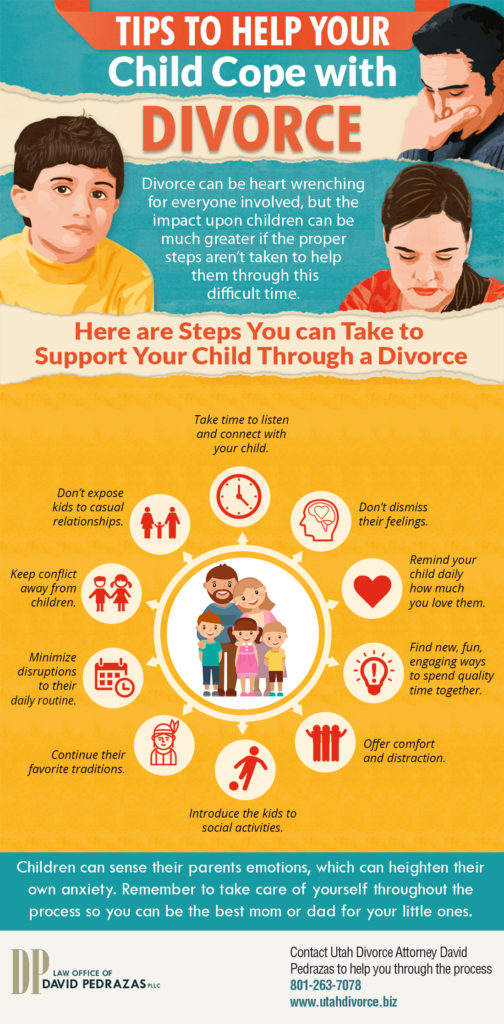Divorce
7 Coping Methods:
Children thrive on consistency and divorce tends to turn their world upside down. Toddlers may not be able to express the finer points of what’s going on, but their feelings are quite sophisticated. They feel the upheaval. When parents express anger and frustration toward each other, the child may feel unsafe. When blaming and bad-mouthing occurs in front of your child, family life can become unsettling. It’s imperative that you rebuild a safe, secure quality of life for your child. Consider these divorce coping ideas to help your child.
1. Provide Reassurance
The absence of one parent can create separation anxiety in your toddler. When they ask: “where’s mommy” or “where’s daddy” give them a solid answer and let them know that both parents love them. Follow that up with a defined time when they’ll see the other parent. Spending additional quality time and reinforcing that the primary people in their lives love them can help ground toddlers. Express love daily.
2. Exercise Patience
Toddlers may experience waves of emotion about the changes in their lives that require you to be more patient than ever. It’s important to recognize that you are also in an acutely stressful period. The combination calls for additional reflection and internal calm. Try to proceed with additional patience when toddlers are unruly or situations feel overwhelming.
3. Maintain Routines
Keeping normal schedules and activities in place helps make your child feel grounded. It’s not necessarily important who makes the usual meals at the usual times or plays the insider game. But, consistency matters to children. It reinforces a sense of security and safety.
4. Be Honest
Telling the truth right from the beginning of a divorce is vital to maintaining a trusting parent-child relationship. Many parents instinctively want to shield children from family problems. Toddlers are intuitive and the older they get, the clearer the picture. You don’t have to be brutally honest, but don’t undermine your own credibility either. Let them know that mommy and daddy no longer live together, but that they both them very much. All children really want to know and feel is that they are still loved, they are safe, and that they are deeply cared for.
5. Build Bridges
You and your former spouse divorced for a reason and hard feeling tend to linger. Take a breath and understand that you are leading separate lives now and forging a friendship is in your child’s best interest. If you have an ongoing war of words with your ex, the child may feel like they are in the middle and need to choose a side. A united front teaches your child that cohesion still exists in his or her family.
6. Tone It Down
Arguments, insults and negative talk about former spouses creates untold anxiety in young children. The complexities of broken marriages are lost on toddlers. The subliminal messages they receive are anger and frustration. That can make toddlers afraid. Polite, inside voices matter.
7. Take Care of Yourself
One of the best ways to be a terrific parent is to take care of yourself. Eat right, stay fit and seek emotional support from friends, family, clergy and mental health professionals. By taking care of your well-being, you’ll be fully prepared to take care of your toddler during the particularly sensitive time.
3 Tips to Help You Adapt to Parenting with Your Ex to Make Things Easier for Your Toddler:
Getting divorced means that all the standard practices must be revisited if you are to keep the lines of communication open. Successful communication helps stabilize things in the two-household family your toddler must negotiate. Co-parenting requires a greater degree of formal communication because you won’t have impromptu opportunities to discuss the daily issues your toddler is experiencing. Consider these parenting strategies.
1. Visitation
Most divorces have a court order in place that defines visitation. But that doesn’t resolve the full breadth of co-parenting issues. Be open to making reasonable changes and expanding the noncustodial parent’s access when appropriate. Of course, agreements should be based on sound reasons and never be spiteful. Consider exchanging all pertinent information such as cell phone numbers, email, medical contacts, babysitters, daycare and other things that simplify pickups and drop-offs.
2. Discipline
Many parents disagree about how children should be punished for poor behavior. One parent tends to be stricter and the other more nurturing. Both are reasonable aspects of parent-child relationships. But parenting separately may run more smoothly if you agree on the penalties for certain infractions. Consistency matters.
3. New People
The rule should be to introduce new love interests very slowly, if at all. Only serious long-term, relationships make sense. Short-term dating interactions can make a child feel like the home is a revolving door. Tread lightly and seek the advice of a family professional before moving forward.
Divorce Attorney David Pedrazas in Salt Lake City, Utah
At the Law Offices of David Pedrazas, we understand that divorce affects the entire family. It’s important to account for the emotional stresses of minor children and we hope this discussion proved helpful. If you are considering divorce, contact David Pedrazas to schedule a Legal Case Review. Give us call at 801-263-7078 today.

